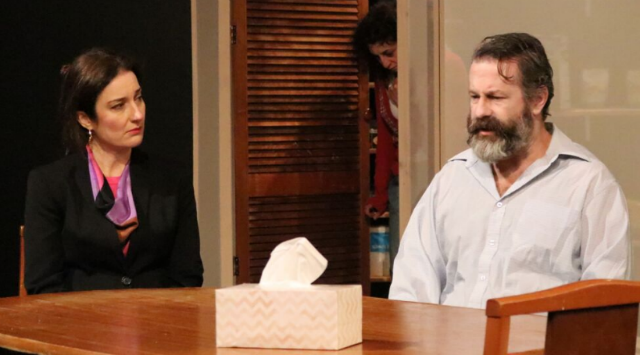Unfortunately, this scenario is all too believable. The impression the audience is given of watching events happening in the immediate present is supported by the everydayness of the chosen setting (design, Rachel Scane), a very plain kitchen and accompanying practical activities of cutting up veggies and making sandwiches. The refugees, Stephen (Brendan Miles) and his distraught twenty-year-old daughter, Sam (Aanisa Vylet), who are being sheltered by courageous Lily (Penelope Lee) inhabit the pantry. In a stroke of genius, the pantry has translucent walls so that while Stephen and/or Sam are discussed and argued over, both can be seen; sad figures in the background, confined and ghostly, dependent upon others for their survival.
Lily, a bank teller by occupation, who has adopted the guise of a ‘bible-basher’ to protect her privacy from a pop-in neighbor (Jeannie Gee), is part of a underground network, comparable to those which managed escaped slaves and fleeing Jews. She is a ‘short termer’, accommodating refugees while a more permanent place is found for them by her ‘handler’, Michael (Peter Condon) with whom she has a relationship based on trust and the shared belief in their humanitarian cause. Ironically, Lily practises the most important teaching of Christ, that we should love our neighbor.
Lily’s neighbor, Miriam, however does not share Lily’s perspective. A nice woman who enjoys gardening, she represents the majority who too readily accept the negative labels the media and the government employ to devalue individuals and groups. She observes the black cars that carry the ‘Goons’ or government agents patrolling the area and sees them not as symbols of oppression, but as guarantors of law and order. As she genuinely likes her neighbor Lily, how will Miriam react when Lily is uncovered as a harbourer of ‘queue jumpers’ and an enemy of the people? How will she react when confronted with the human face of the ‘illegals’, the loving father, Stephen and traumatised Sam, whose mother gave her life to save her daughter.
Lily’s carefully guarded world is turned upside down after Michael introduces the sophisticated Kristy (Amanda Maple-Brown) into her safe house. Can Kristy be trusted, and after so many twists and turns to her story will Lily’s initial doubts of Kristy’s integrity be justified? And is the dignified Stephen with whose struggle we feel the deepest empathy really to telling the truth about himself? And will it be possible for Sam to carry the burden of two lives sacrificed to secure her welfare and still find some sort of peace?
The play is absorbing. From the moment we first meet Stephen trying to improve his English by listening to a shock jock fulminating against ‘illegals’, we are caught up in his struggle for a chance to make a decent life for himself and Sam. While his supposed lack of English seems to recede into the background, Miles’s ability to hold the character as given is commendable and deeply moving. It is Lee who is at the heart of the play, however. A quiet woman who acts on the prompting of her conscience, and although she is severely tested and also to some extent exposed by the way events unfold, she holds her moral ground.
$5 of every ticket sold for the performances on August 3rd, 7th and 10th will be donated to the Asylum Seekers Centre.
It is estimated that there were more than 65 million people sought asylum in 2015 and the world is facing tough decisions on how best to deal with this unprecedented humanitarian crisis. A Nest of Skunks asks us to reject unthinking condemnation of asylum seekers, to subject government policies and media polemics to rational scrutiny and to look to our own hearts for moral guidance. Like the resolute Lily, we know what is right but like Miriam we can be easily convinced that our security necessitates oppressive and cruel action.





